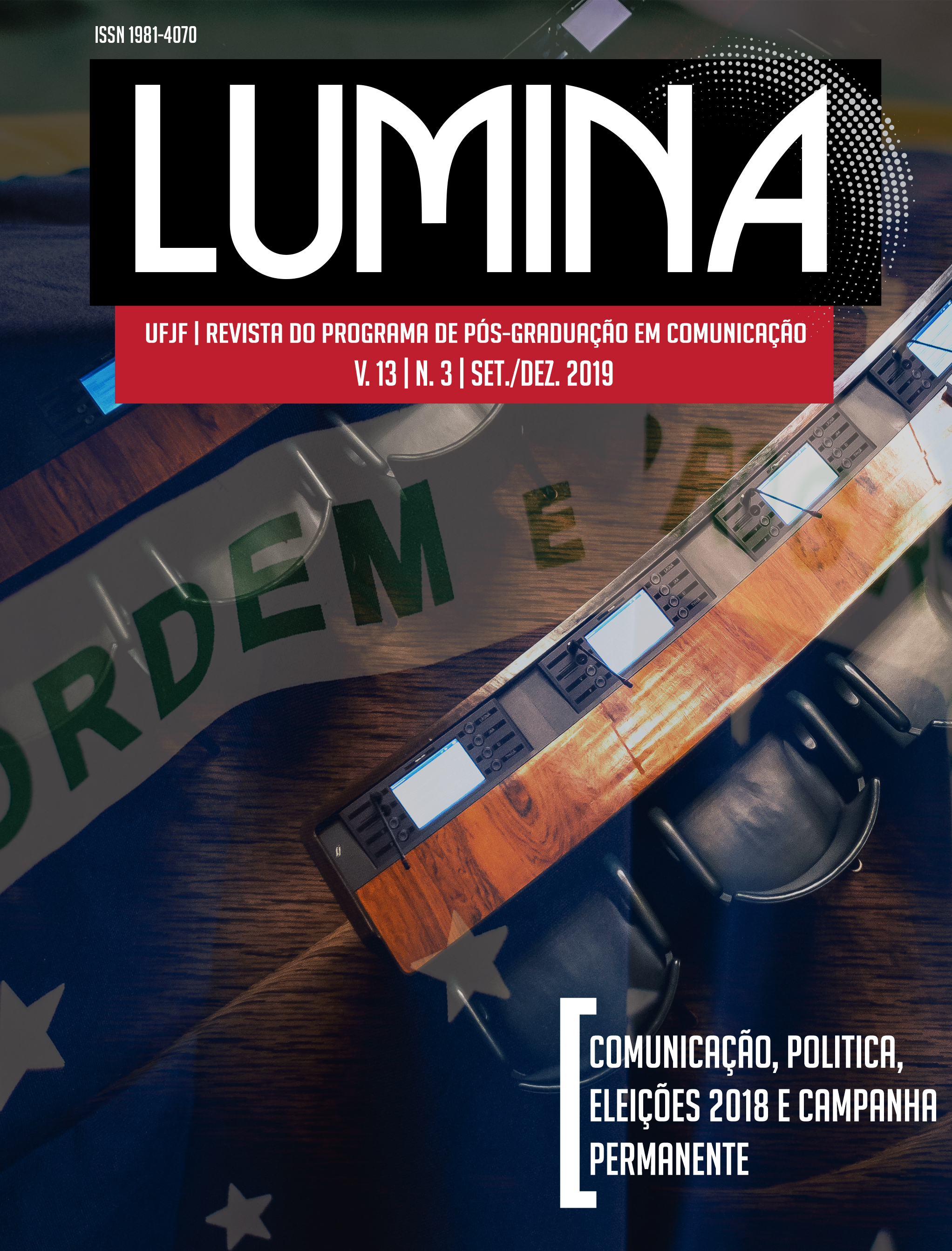Comunicação política no Facebook e previsão eleitoral - Análise de big data da eleição presidencial brasileira de 2018 no Brasil
Big data analysis of the 2018 Brazilian presidential election Brazil
DOI:
https://doi.org/10.34019/1981-4070.2019.v13.28589Palabras clave:
comunicação política, previsão eleitoral, opinião pública, mídias sociais, big dataResumen
O presente artigo busca entender como a análise quantitativa da comunicação política nas mídias sociais, mediante indicadores de engajamento ao discurso de candidatos, é capaz de prever o resultado eleitoral. Trata-se de uma análise de big data do 1º turno do pleito presidencial de 2018 no Brasil. Concretamente, foram coletadas cerca de 10 mil postagens das páginas oficiais de campanha no Facebook entre 1 de junho e 7 de outubro de 2018. No que se refere à intenção de voto, foi realizada para o mesmo período uma série surveys de opinião com frequência diária, representativa da população brasileira. Com o fim de entender se há uma relação causal entre o engajamento ao candidato no Facebook e a sua intenção de voto, a análise preditiva foi realizada testando duas abordagens empíricas: uma com dados agregados e a outra com 90 modelos de previsão mediante regressão linear múltipla. Concluímos a análise comparando os resultados reais das eleições com todos os modelos preditivos. Os resultados mostraram que tanto a abordagem agregada quanto a regressiva demonstram que o índice de engajamento ao candidato no Facebook é um bom preditor eleitoral. Os resultados obtidos reforçam as teorias que defendem a relevância dos dados advindos do comportamento político nas mídias sociais como bons preditores eleitorais.
Descargas
Citas
BORA, N.N. (2014) Summarizing public opinions in tweet. In Journal Proceedings of CICLing, 2014.
DIGRAZIA J, MCKELVEY K, BOLLEN J, ROJAS F. More Tweets, More Votes: Social Media as a Quantitative Indicator of Political Behavior. PLoS ONE 8(11): e79449. https://doi.org/10.1371/journal.pone.0079449, 2013.
DAYAN, D.; KATZ, E. Media events: the live broadcasting of history. Cambridge: Harvard University Press, 1992.
GAYO-AVELLO, D.(2014). “I wanted to predict elections with twitter and all I got was this lousy paper” – A balanced survey on elections prediction using twitter data. CoRR – http://arxiv.org/abs/1204.6441.
GAYO-AVELLO, D., METAXAS, P. AND MUSTAFARAJ, E. (2011). Limitis of election predictions using twitter. In Int. Conf. on Weblogs and Social Media (ICWSM), pages 490-493.
GHOSH, S., VISWANATH, B., KOOTI, F., SHARMA, N.K., KORLAM, G., BENEVENUTO, F., GANGULY, N., AND GUMMADI, K.P. (2012). Understanding and combating link farming in the twitter social network. In Int. Conf. on World Wide Web, WWW’ 12, pages 61-70.
GOMES, N. Formas persuasivas de comunicação política. Propaganda Política e Publicidade eleitoral. Porto Alegre: EDUPUCRS, 2004.
GUO, L., MCCOMBS, M. (2015). The Power of Information Networks: New Directions for Agenda Setting. (L. Guo & M. McCombs, Eds.). Routledge.
JUNGHERR, A., JÜRGENS, P. AND SCHOEN, H. (2012). Why the pirate party won the german election of 2009 or the trouble with predictions: A response to Tumasjan, A., Sprenger, T.O., Sander, P.G., & Welpe, I.M.”Predicting elections with twitter: What 140 characters reveal about political sentiment”. Soc. Sci. Comput. Rev.,30(2):229-234.
KRISTENSEN JB, ALBRECHTSEN T, DAHL-NIELSEN E, JENSEN M, SKOVRIND M, BORNAKKE T. Parsimonious data: How a single Facebook like predicts voting behavior in multiparty systems. PLoS ONE 12(9): e0184562, 2017.
LUMEZANU, C., FEAMSTER, N., AND KLEIN, H. (2012). #bias: Measuring the tweeting behavior of propagandist. In Int. conf. on Weblogs and Social Media (ICWSM), pages 210-217.
MUKHERJEE, S., MALU, A., A.R., B., AND BHATTACHARYYA, P. (2013), Twisent: a multistage system for analizing sentiment in twitter. In Int. conf. on Information and knowledge management, CIKM’ 12, pagens 2531-2534.
NORRIS, P. Democratic divide? The impact of the Internet on parliaments worldwide. Harvard, Harvard University, John Kennedy School of Government, 2000.
SALGADO, S. Campanhas eleitorais e cobertura mediática: abordagens teóricas e contributos para a compreensão das interações entre política e media. Revista Brasileira de Ciência Política, n.9, pp. 229- 253.
TRUMPER, D. S., MEIRA, W., & ALMEIDA, V. From Total Hits to Unique Visitors Model for Election’s Forecasting. Proceedings of the ACM WebSci’11. Koblenz, 2011.
TRUMPER, D. S., MEIRA, W., & ALMEIDA, V. From Total Hits to Unique Visitors Model for Election’s Forecasting. Proceedings of the ACM WebSci’11. Koblenz, 2011.
TUMASJAN A, SPRENGER T. O., SANDNER P. G., AND WELPE I. M.. Election Forecasts With Twitter: How 140 Characters Reflect the Political Landscape. Social Science Computer Review, 2010.
TUMASJAN, A., SPRENGER, T.O., SANDER, P.G., & WELPE, I.M.(2010). Predicting elections with twitter: What 140 characters reveal about political sentiment. Int. conf. on Weblogs and Social Media (ICWSM), pages 178-185.
WEIMANN, G., BROSIUS, H.-B. (2016). A New Agenda for Agenda-Setting Research in the Digital Era. In HENN, P., VOWE, G. (Eds.), Political Communication in the Online World: Theoretical Approaches and Research Designs (pp. 26–44). New York: Routledge.
YASSERI T, BRIGHT J. Wikipedia traffic data and electoral prediction: towards theoretically informed models. EPJ Data Sci, 2016.
Descargas
Publicado
Cómo citar
Número
Sección
Licencia
Autores que publicam nesta revista concordam com os seguintes termos:
- Autores mantém os direitos autorais e concedem à revista o direito de primeira publicação, com o trabalho simultaneamente licenciado sob a Licença Creative Commons Attribution que permite o compartilhamento do trabalho com reconhecimento da autoria e publicação inicial nesta revista.
- Autores têm autorização para assumir contratos adicionais separadamente, para distribuição não-exclusiva da versão do trabalho publicada nesta revista (ex.: publicar em repositório institucional ou como capítulo de livro), com reconhecimento de autoria e publicação inicial nesta revista.
- Autores têm permissão e são estimulados a publicar e distribuir seu trabalho online (ex.: em repositórios institucionais ou na sua página pessoal) a qualquer ponto antes ou durante o processo editorial, já que isso pode gerar alterações produtivas, bem como aumentar o impacto e a citação do trabalho publicado (Veja O Efeito do Acesso Livre).









